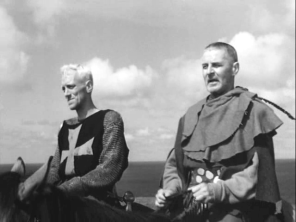The Seventh Seal (Day 93)

My Opinion: 8.6 || A great story beautifully filmed — dark, profound, and surprisingly funny. The play-like staging is occasionally stiff, but the movie has superb intellectual depth and emotional strength.
TITLE: The Seventh Seal (Det sjunde inseglet)
DIRECTOR: Ingmar Bergman
LANGUAGE: Swedish | COUNTRY: Sweden
YEAR: 1957
PROFILE: Historical Drama | 96 minutes | IMDb (8.2)
SYNOPSIS (Courtesy of IMDb): A man seeks answers about life, death, and the existence of God as he plays chess against the Grim Reaper during the Black Plague.
Strengths: Like Bergman’s Wild Strawberries, this is a mortality-themed road movie with lightly fantastical touches and an episodic structure. But the framing device here of a chess game with Death provides an immediacy and narrative tightness that’s lacking in Wild Strawberries. The cinematography is excellent. Bergman captures the natural surroundings vividly and achieves lovely effects with smoke and mist.

The film is a brief, unstuffed 96 minutes, yet presents a beautifully comprehensive view of life and the human condition. The yearning of Max von Sydow’s knight to understand life before he dies is intellectually stimulating and resonates with dignity. And the film is far less dreary and abstruse than its synopsis might suggest. There’s great seriousness of the encroaching plague, leering thugs, and loitering Grim Reaper, but that gravity is balanced by moments of generosity and joy. Sharp dialogue, delightful characters, and impressive wit — it’s an entertaining film.
Weaknesses: Bergman brings a classically theatrical style to the film. Many scenes are staged in a manner that suggests a play, even to the point of providing sotto voce asides — you could transfer much of the movie to the stage with minimal changes. The problem with this (apart from my personal impatience with movies that look like filmed plays) is that it imparts an artificiality that limits our sense of place. We become immersed in the movie’s ideas and moral yearning, but the world of the story remains a stiff conceit.
Characters/Performances: The stageyness applies to some performances as well. What we get with some characters is overly broad comic relief, and the female characters are given much less to do than their male counterparts. With that being said, the three central characters are Shakespeare-worthy creations. Nils Poppe is charming as Jof, an actor, husband, and seer-of-visions, Jof. And Max von Sydow (what a career) brings wonderful dignity and pathos to the role of the knight Antonius. The most interesting role, however, belongs to Gunnar Björnstrand as the jaded, sarcastic squire Jöns. It’s a sharply written part, with the movie’s wittiest lines, and Björnstrand is in perfect command — intimidating when he needs to be, funny without straining for laughs, and modestly moral.

Best Moment: Antonius and Jöns meet a young girl who has been convicted of possession and condemned to burning at the stake. Their eventual attempt to intercede is subtly moving, and their dialogue about the devil is one of Bergman’s best.
File Under: plague, mortality, possession, actors, knights, road movies, high-stakes chess